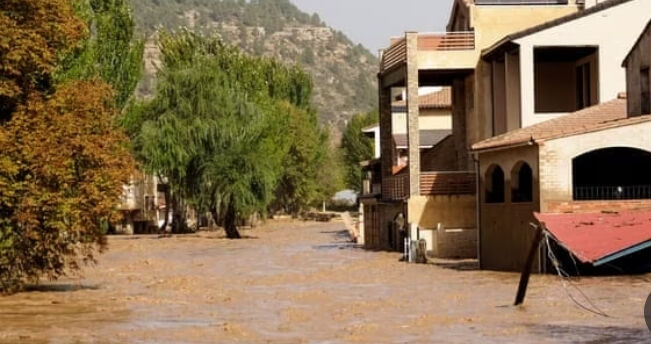Spain Floods Most Likely Caused by Climate Change
At least 155 people have reportedly died with more rain forecast for the flood-hit region of Valencia. Death toll expected to rise amid anger over preparedness, with death toll expected to rise as the search continues.
An official source said bodies were likely to have been trapped in cars as rescue workers, residents and the military have been working at pace in a bid to find survivors and to clean-up after yesterday’s floods. There are no confirmed numbers of those missing.
Spain’s prime minister Pedro Sanchez urged people to stay at home during a visit to flood-hit Valencia and has said they will search for as long as it takes to find any survivors. More rain is expected throughout today, with parts of Valencia notably subject to an AEMET yellow weather warning.
As well as the damage caused to roads, businesses and neighbourhoods, farms in Valencia have also borne the brunt of the flash floods.
“Now the fruit is going to rot. Even the trees can die because they have been under water for 36 hours … With the heat, the humidity, the fungus will attack them too,” a citrus farmer told the Reuters news agency by phone from his farm in the Alzira area.
Spanish authorities said on Wednesday that at least 72 people had died in the Valencia region overnight after flash-flooding followed heavy rain. Utiel in Spain suffered same fate, destroying farmlands.
Valencia as a whole accounts for nearly two-thirds of citrus fruit production in Spain – the world’s top exporter of oranges. Persimmon, a soft, orange-coloured fruit is another major regional crop, along with avocados, almonds and grapes for wine-making.
The floods have caused massive damage to infrastructure, and affected thousands of hectares of farmland, agricultural groups and farmers said.
In the rice-growing area of Albufera, fields were totally sumerged, with only a few farm buildings and trees visible above the water, Reuters pictures showed.
But while citrus crops are generally insured in the region, the proportion of vineyards and nut crops with insurance is low, Bayo said.
The floods also washed away machinery, irrigation systems and roads, said Manuel Alcaide, spokesman for farmers’ association COAG, who said it was too early to calculate losses.
Livestock was also killed as the floodwaters swept in. In Utiel, one of the worst-affected towns in Valencia, Javier Iranzo and Ana Carmen Fernandez said the flooding had completely wrecked their pig farm, with 50 of their animals having drowned
Global heating made the heavy rainfall that lashed Spain this week about 12% heavier and twice as likely, an initial estimate from climate scientists has found.
The early-stage analysis, carried out by scientists from the World Weather Attribution, said climate change was “the most likely explanation” for the unusual strength of the downpour.
The group pointed to historical weather observations that showed one-day bursts of rain in the region have increased as fossil fuel pollution has heated the planet. They also highlighted a physical relationship that shows hotter air can hold more moisture – about 7% for every 1C that temperatures rise.
“We are loading the dice of extreme weather in the worst way possible,” said Ben Clarke, a researcher at Imperial College London.
To properly quantify the influence of global heating, the group would have to use models to project the probability of such heavy rainfall hitting in a hypothetical climate without human activity.
Their estimate comes as a separate analysis from Climate Central finds climate change made the hot sea surface temperatures that fuelled the downpour at least 50 to 300 times more likely.

